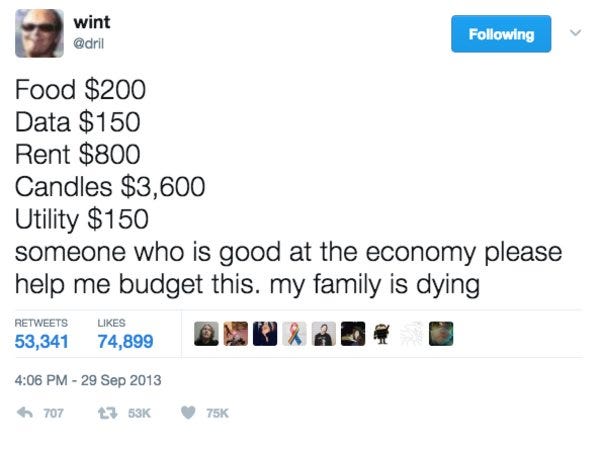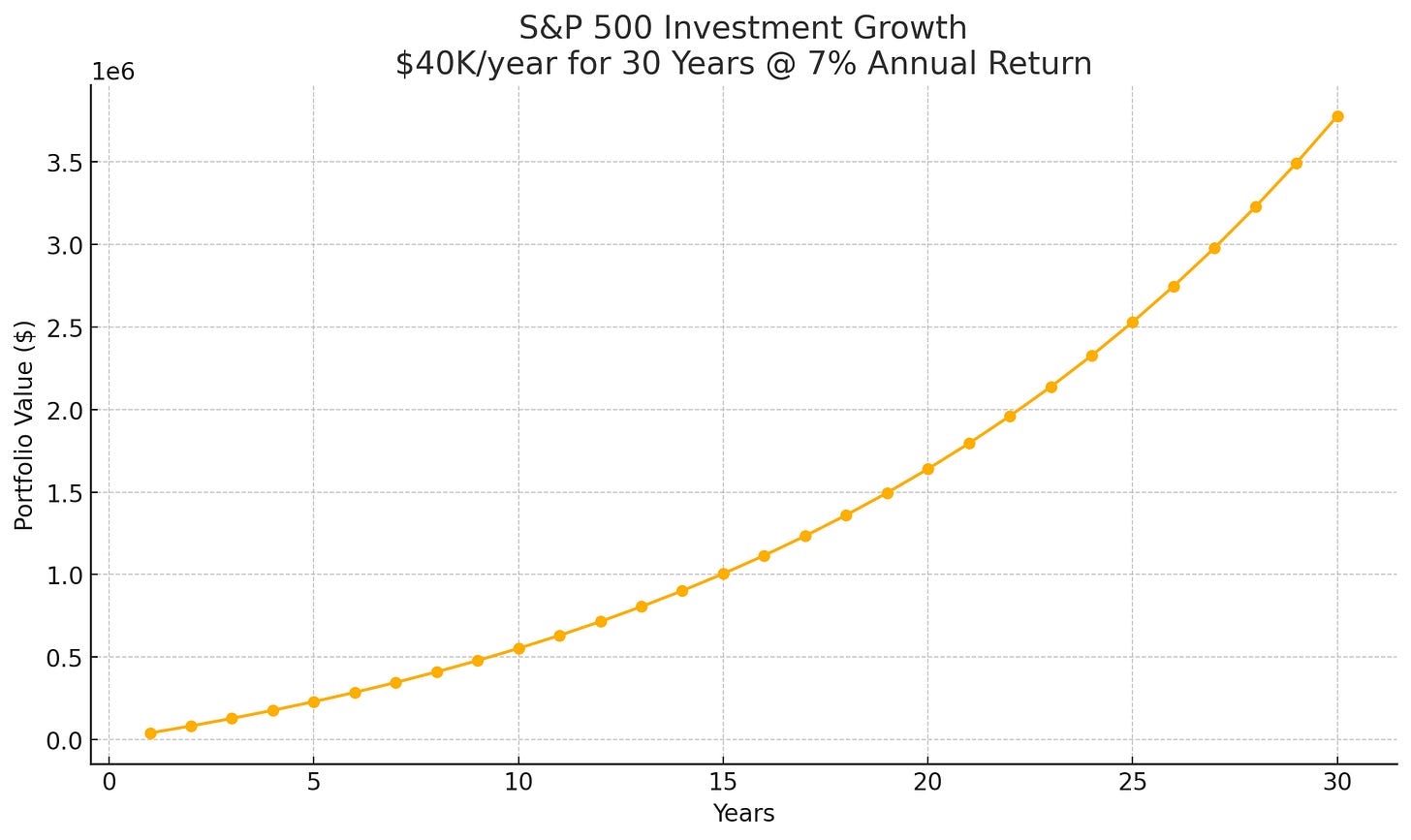250K per year is plenty of income
If you don't feel rich here, you probably never will
The WSJ has a story sharing people who make 250K and don’t feel rich. You don’t even need to read it if you don’t want, the whole thing is right in that sentence. It starts with a couple making 350K that feels stretched (they own a vacation home! they eat takeout all the time!). Note: 250K per year puts you in the top 2-3% of households in America and in the top .1% of global earners. Congrats on making it if you get to this point.
Anyway I fired off a Tweet about this because I love talking finances on social to check sentiment on these things. These discussions always surface people’s distorted views of money, as even those who make this much don’t know better than to constantly compare themselves to the ultra wealthy (never do this). Here, I called people who make a quarter mil and feel poor (don’t feel rich, whatever, it’s the same at these levels) irresponsible with money, living a life of comparison or gambling addicts. Because really this is what that means.

Twitter of course hates this conversation because half that website is comprised of people terrible with money, or who actively trade (gamble) crypto/equities etc, or enjoy private taxis for their burritos (Uber eats). It was interesting because users were quick to reply “oh yeah you’ve never lived in SF or NYC.” I in fact lived in SF for a decade on less, then somewhat more than this income, so I’m well aware. I also managed to save quite a bit on these numbers, because I lived within my means. Being in SF or NYC means you don’t need a car, can have roommates, etc and save a lot. It’s not that difficult. If you have a family and live there, that’s a choice too. Potentially irresponsible if all your money goes to rent.
Some were quick to point out inflation, which is true (I’m still posting the meme, I’m sorry). But this illustrates the actual problem: people making 6 figures who haven’t been steadily saving money in assets and not cash for many years. Of course if you were to simply keep cash you would feel the pinch of inflation (still, cut back on the delivery). But why are people doing this? That I would also classify as irresponsible. Others pointed out if you had a family of 5 in NYC on 250K you wouldn’t feel rich. That’s possible. You could take the SF or NYC salary and live elsewhere (geo arbitrage). Or if you feel so poor there, move to Austin or another major city that actually builds housing and prices are coming down and find new employment (you can have a home there for ~500K). Humans have agency, you can make decisions. Or don’t, it depends how you want to live. Everything has tradeoffs.
The point is, if you make 6 figures+, you are in the absolute top % earners on planet Earth. If you don’t feel rich on this, you’re doing something wrong (excluding people with rare medical conditions, of course). That’s not to say expenses might be high, but the point is you should be living frugally, compounding savings in low cost index funds, and within a short time feel rich. Certainly by the time you reach 250K. You shouldn’t require material things to feel this way. With some financial security you are free to not worry so much, the people who feel poor or merely average at these income levels are living beyond their means, something clear when you see their expenses. But many Americans can’t help themselves. They suffer from the concept of hedonic adaptation. They make more, so they feel they should get to spend more. But when you arrive, you’ll have built habits to feel rich on not very much.
It’s amazing how predictable this cycle is. The problem isn’t the salary, it’s the ladder in people’s heads. They think wealth means mimicking the lifestyle of someone earning 10X what they do. It’s almost always lifestyle creep. And no income is safe from it. I’ve met people making half a million a year who live paycheck to paycheck. And people making 120K/year who quietly amassed seven figures over time because they never made spending part of their identity. Not through Soviet-level deprivation, but through control. You can still enjoy life. Just maybe not with three streaming services, four DoorDash deliveries a week, and a leased car you don’t need.

Grace Groner was a secretary who turned $180 into $7 million, lived frugally, and died never spending a penny of it. She worked as a secretary for 43 years at Abbott, bought a few shares of stock in 1935 for $180 and let time do the rest. How many of you are willing to do something like this? You don’t even need to own individual equities, we now have financial instruments like the S&P anyone can purchase, which if you save in regularly will compound over time. There’s many quiet millionaires like this, in fact over 24 million Americans are millionaires now. Yes there’s inflation, and it’s not as much as it was. It’s still plenty to feel rich. You don’t need things. You need security. Anyone can build a budget and accomplish this.
We treat wealth like it’s a status you perform: vacations, watches, private schools, rather than what it is: a buffer between you and misfortune. That’s what Grace Groner understood. Security, not showing off. Nobody needs to know you’re rich. Ideally, nobody can even tell. That’s real power and real freedom.
People get upset about this conversation for a number of reasons. I totally understand, while I’ve never been on the hedonic treadmill or kept up with the Jonses, I did over-speculate on investments for a time because, admittedly, it’s fun. Still, I learned the lesson, and it only strengthened my reserve in terms of living cautiously. For a short period I didn’t feel very well off, but I rebuilt and feel fine again, on not really that much income (many of you make way more, I’m not at FANG any longer, I’m at a startup). If I can do this you can, it’s similar to being out of shape physically. You have to change some behaviors. All fixable.
If someone making 250,000 saved 16% of their income in the S&P, they’d have over a million pretty quick, and only upwards from there (around 3.8 million by retirement). This is wealthy enough to me, any sane person would feel similar. My numbers might be aggressive, if you only saved 10% you’d still have 2.4 million by the end. Very doable. This doesn’t even include things like 401Ks or employer-matched savings, you could do this in a normal taxable account to draw from if you really needed to prior.
These numbers aren’t hypothetical. This is the quiet math of compounding. No yachts, no lottery wins, just slow, consistent investment. Most people don’t need more income. They need fewer temptations. That’s why personal finance is mostly personal and not actually all that financial.
There’s some research saying people in gen Z think you need 500K a year to succeed. Who knows if they’re trolling the study, or it was localized to people in large cities. But regardless they have grown up in an inflationary environment, watching Mr Beast give out 6 figures to winners of his games like it’s candy. They’ve watched Instagram influencers travel the world and buy lambos. It’s actually fairly sad what we’ve done to young people here. It’s not entirely their fault, as the fed continues to print money and our government actively does devalue the currency. Still, we cannot change the wind, we can only adjust the sails. An inflationary environment should simply cause you to save in assets of some sort and try not to hold much cash other than for emergencies.
Another thing happening is the internet economy is a “winner take most” situation, and people are constantly exposed to winners. So they feel if they’re not with absolute top, ultra-wealthy earners, they’re a loser. Comparison used to be limited to your street. Maybe the guy with the nicer lawn or car. Now it’s global. Every 25-year-old is measuring their life against a guy in Dubai filming “motivation” content in front of a rented McLaren. It’s not real. But the envy is, and that’s corrosive. It’s what makes $250K feel like minimum wage to some people. But the feeling is a lie. Comparison is a thief of joy. Don’t get on that ride, kids.
One last comment on this: ZeroHedge hyperinflation, “America is over” mentality has leaked into the general population and that’s driving some of this “I has a sad” about the economy and “not feeling rich” mentality as well. These are what we call permabears. They are right every 10 years or so, but for the most part they’re depressed/nihilistic and simply project that thinking onto everything. Bears sound smart, bulls make money. America produces the greatest companies, entrepreneurs and wealth-generators on the planet. We have the most possible movement from poor to rich. Anyone can do it. People from Warren Buffett to Ross Gerber all understand this. I just don’t see who even would want to take our place on the global stage, no one else even acts like it. So be happy you live here, drop the victim stuff, live within your means, stop comparing yourself to others and buy index funds. Any of us can feel rich, with the right habits.







I grew up poor and was used to bringing my own sandwich to eat pretty much everywhere, which is now against the rules in many places. Or I would glue my shoes together when the sole came off.
I got yelled at one time for trying to use another person's conference badge to enter a trade show by the events team when I was at a large tech company. It didn't even occur to me that it would be problematic, having done it so many times in startups—poor man's mentality. LOL.
Doing these things brands you as poor and not Ivy League material, which I quickly recognized and started buying expensive lunches, more shoes, and paying for my own conference pass.
The social pressure to appear wealthy is immense, especially for those who are not. But I still have never used Doordash or Uber Eats, and I love to bring peanut butter and jelly on every bike ride. Some habits die hard. Thanks for sharing this.
How much of this is just straight up housing/inflation? From a CPI standpoint, $250k today is roughly equivalent to $200k in 2020. If we adjust this to the 2015-2020 window, the number is $231k. So basically we experienced so much more inflation than we were accustomed to.
For the post Covid homeowners, I kind of get it. If you grew your income by 75%, you’re basically able to afford the same house you could’ve bought in 2019 on that income. I know, I know…so many people have it worse. But inflation sucks and even the absurdly wealthy hate feeling ripped off.